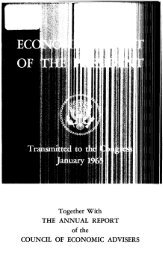Economic Report of the President
Report - The American Presidency Project
Report - The American Presidency Project
- No tags were found...
You also want an ePaper? Increase the reach of your titles
YUMPU automatically turns print PDFs into web optimized ePapers that Google loves.
percent from <strong>the</strong> first half <strong>of</strong> 1981 to <strong>the</strong> first half <strong>of</strong> 1982. Exporters<strong>of</strong> primary products were hit particularly hard: real commodityprices fell by 25 percent from <strong>the</strong> fourth quarter <strong>of</strong> 1980to <strong>the</strong> second quarter <strong>of</strong> 1982.• High real interest rates. In 1981 and <strong>the</strong> first half <strong>of</strong> 1982, Euromarketinterest rates averaged 16 percent, while wholesale pricesin <strong>the</strong> United States rose at an annual rate <strong>of</strong> only 4.5 percent.• The appreciation <strong>of</strong> <strong>the</strong> dollar. Since most international debt is denominatedin dollars, while commodity prices tend to follow aweighted average <strong>of</strong> industrial country currencies, <strong>the</strong> effect <strong>of</strong><strong>the</strong> rise in <strong>the</strong> value <strong>of</strong> <strong>the</strong> dollar was a sudden increase in <strong>the</strong>size <strong>of</strong> developing country debt relative to prospective exportearnings.The result <strong>of</strong> <strong>the</strong>se developments was that banks, which had beenwilling to lend large amounts to developing countries throughout <strong>the</strong>1970s, lost confidence that <strong>the</strong> loans would be promptly repaid. Thedebtor countries were highly vulnerable to such a loss <strong>of</strong> confidence.Much <strong>of</strong> <strong>the</strong>ir debt was <strong>of</strong> short maturity, so that a large fraction <strong>of</strong><strong>the</strong>ir debt required refinancing each year. Argentina, Brazil, andMexico, for example, must make annual payments <strong>of</strong> principal andinterest which exceed <strong>the</strong>ir total exports <strong>of</strong> goods and services.During <strong>the</strong> 1970s <strong>the</strong>se large financing needs did not pose a problem,since countries were able to roll over <strong>the</strong>ir debt as it came due.In <strong>the</strong> summer and fall <strong>of</strong> 1982, however, banks became reluctant tomake new loans and roll over old ones, first to Mexico and <strong>the</strong>n too<strong>the</strong>r countries. The result was a quick exhaustion <strong>of</strong> <strong>the</strong> foreign exchangereserves <strong>of</strong> <strong>the</strong> major debtors.IMPLICATIONS OF THE DEBT PROBLEMThe debt situation <strong>of</strong> <strong>the</strong> developing countries poses two problemsfor <strong>the</strong> world economy. Although quite unlikely, failure to resolve <strong>the</strong>debt situation in an orderly way could lead to major financial marketdisruptions. More likely—indeed, it has already happened to a considerableextent—is a situation <strong>of</strong> forced austerity in debtor countries,with adverse effects on world trade and output.Risks to Financial MarketsThe threat <strong>of</strong> a financial disruption arises from <strong>the</strong> possibility thatdebtor countries will be unable to live within <strong>the</strong>ir new financial constraints.The unwillingness <strong>of</strong> banks to lend as much as in <strong>the</strong> recentpast means that debtor countries will need to cut <strong>the</strong>ir imports orexpand <strong>the</strong>ir exports. In <strong>the</strong> case <strong>of</strong> <strong>the</strong> most heavily indebted countries,this will almost certainly mean achieving substantial trade surplusesin spite <strong>of</strong> depressed demand for <strong>the</strong>ir exports. The concern74
















